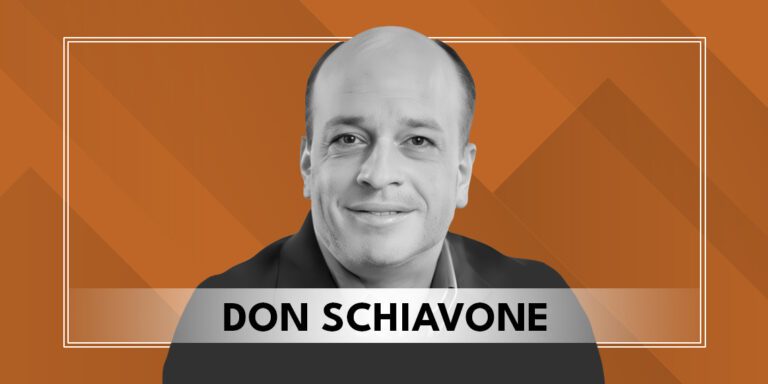"Complacency is dangerous because it makes you believe that what worked yesterday will work tomorrow, and that’s rarely the case."
With a career spanning over three decades, Dominic “Don” Schiavone has developed a reputation as one of the foremost experts in scaling businesses and driving exponential growth. As the former COO of Grasshopper and current Managing Director and COO at CEO Coaching International, Don has consistently proven his ability to lead organizations through pivotal transformations. His leadership helped Grasshopper achieve 21 consecutive quarters of growth, culminating in a $170 million acquisition by Citrix. Don’s strategic focus on disciplined execution, thoughtful experimentation, and data-driven decision-making has made him a go-to mentor for entrepreneurs and executives alike.
In this interview, Don shares his tactical approach to business transformation, breaking down his “test and learn” philosophy, the importance of setting realistic goals, and how to fire those critical Q1 bullets to set your company on the path to sustainable success. Whether you’re leading a startup or managing a high-growth enterprise, Don’s insights offer a roadmap for navigating the complexities of modern business with precision and purpose.
WOULD YOU LIKE TO GET FEATURED?
All interviews are 100% FREE OF CHARGE
Table of Contents
Don, you’ve had an incredible journey spanning over 30 years in business operations and management. Let’s start at the beginning—how did your career path lead you to where you are today?
Don Schiavone: Thank you! It’s been quite a ride. I started my career in 1991 as a Senior Engineer at Westinghouse Electric Corporation, working on research and development. It was a strong technical foundation, but I was always drawn to the bigger picture—how businesses function as a whole, especially from a leadership and strategic standpoint. That curiosity eventually led me to pursue an MBA at The Wharton School in 1997, which opened doors to more management-focused roles.
Over the years, I transitioned into senior positions like VP of Professional Services at Granitar, and later, I co-founded Sagebridge Solutions. That entrepreneurial venture gave me hands-on experience in growing businesses from the ground up, which helped when I later joined Grasshopper as COO. That was a pivotal point in my career because it involved scaling a company rapidly while navigating complex market challenges.
Speaking of Grasshopper, you helped grow the company into an attractive acquisition target, eventually leading to its sale to Citrix for over $170 million. What were some of the key strategies that drove this success?
Don Schiavone: Grasshopper’s growth was a combination of consistent execution and not being afraid to evolve. We beat our quarterly business goals for 21 consecutive quarters, but that didn’t happen by just maintaining the status quo. We were proactive in analyzing what worked and what didn’t.
One of the turning points was when we realized our current growth rate wouldn’t be sustainable in the long term. We had to make some tough decisions, like cutting what wasn’t delivering and doubling down on our core strengths. We also experimented with new products and marketing strategies without fear of failure—some worked, some didn’t, but those that did help us not only meet but exceed our targets.
You’ve mentioned that complacency can kill a company. Can you elaborate on that and how businesses can avoid falling into that trap?
Don Schiavone: Absolutely. Complacency is dangerous because it makes you believe that what worked yesterday will work tomorrow, and that’s rarely the case. Markets change, customer expectations evolve, and your competition is always moving.
One of the first things I tell clients today is to always be critical of their success. You have to ask yourself, “Are we still doing what’s best for the company, or are we coasting?” At Grasshopper, we knew that growth wasn’t just going to happen by doing the same things year after year. We took a hard look at our operations every quarter, tested new strategies, and made adjustments. You’ve got to keep evolving to stay ahead of the competition.
Let’s talk about financial planning. You’ve spoken in the past about creating a solid and realistic baseline before setting ambitious goals. How do you recommend companies approach this?
Don Schiavone: Financial planning is all about understanding where you’re starting from. Before you set big, hairy, audacious goals (BHAGs), you need to have a clear, data-driven baseline of your current performance. This means going through your P&L from the previous year, understanding what drove both successes and failures and determining what’s repeatable.
That baseline helps ground your goals in reality, so when you set ambitious targets, they’re not based on hope but on actual performance data. Your team will be more motivated to hit those goals because they’ll know what’s possible and what they need to improve on.
How do you strike the balance between setting realistic goals and avoiding complacency?
Don Schiavone: The key is to aim high but stay grounded. Your baseline gives you a starting point, but you should never just aim for incremental growth. Once you’ve assessed where you stand, it’s important to think about how you can transform your business. What can you do differently to scale faster?
That’s where quarterly experiments come in. Start small, test different strategies—whether it’s improving your marketing funnel, sales conversion rates, or customer acquisition—and see what works. The idea is to “fire bullets” as I call it, during the first quarter, meaning test small initiatives that can lead to big results later.
You’ve mentioned the importance of firing those Q1 bullets. How does this process help businesses stay agile and drive growth?
Don Schiavone: Businesses that rely on rigid, top-down growth strategies often struggle because they’re not flexible. By focusing on small tests—those Q1 bullets—you can gauge what’s working early on and adjust quickly. For example, at Grasshopper, we had an idea for a new product offering. Instead of fully building it first, we put up a web page to gauge market interest. This approach allowed us to gather feedback, adjust pricing, and tweak the concept before committing significant resources.
It’s a strategic way to increase your chances of success without overcommitting. And if those tests don’t work, you move on, but if they do, they can become key drivers of growth.
After running these tests, how do companies ensure they’re learning from them and continuing to improve?
Don Schiavone: The most successful companies have a rhythm of reviewing, learning, and implementing. At the end of each quarter, you should be reviewing what worked and what didn’t. Those initiatives that worked should become part of your regular operational cadence, and the ones that didn’t should be discarded.
It’s also crucial to integrate learnings from your tests into your daily operations. This means consistently asking, “What did we achieve? What can we improve? What are our next steps?” That’s how high-growth companies stay on top—they’re always iterating, always improving, and always ready to adapt.
One final question, Don. With your extensive experience in coaching and mentoring entrepreneurs, what is the most important piece of advice you would give to someone trying to scale their business?
Don Schiavone: Focus on the fundamentals: people, processes, and systems. People are the most important—build a great team and invest in their growth. Then, make sure you have solid processes to guide them, and the right systems in place to support them. Once you have these three pillars aligned, scaling your business becomes a lot more manageable. And always be willing to test, learn, and adapt. That’s the key to sustained growth.
Jed Morley, VIP Contributor to ValiantCEO and the host of this interview would like to thank Don Schiavone for taking the time to do this interview and share his knowledge and experience with our readers.
If you would like to get in touch with Don Schiavone or his company, you can do it through his – Linkedin Page
Disclaimer: The ValiantCEO Community welcomes voices from many spheres on our open platform. We publish pieces as written by outside contributors with a wide range of opinions, which don’t necessarily reflect our own. Community stories are not commissioned by our editorial team and must meet our guidelines prior to being published.
Read Special Edition Articles
- 10 Traits of Highly Successful Entrepreneurs
- Unlocking the Secrets of Smart Goal Setting Leads to Success
- Maximizing the Power of Networking: The Key to Growing Your Business
- Conquering the Top 5 Most Common Challenges Faced by Entrepreneurs
- Discovering the 3 Essential Steps to Building a Strong, Effective Team as a Startup Founder
- The 7 Key Roles of Market Research in Startup Success
- 5 Ways to Unleash the Benefits of Mentorship for Entrepreneurs
- Mastering Financial Management: The Key to Success for Small Business Owners
- The Impact of Artificial Intelligence on Job Markets
- Resilience and Persistence: The Two Essential Ingredients for a Successful Business






